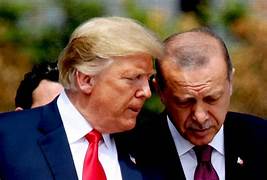Ambassador Barrack’s mission and ongoing efforts for the F-35 program
Behind-the-scenes efforts have been intensifying rapidly in recent days towards a potential visit by Turkish President Erdogan to the White House. The prevailing view in Washington is that the geopolitical moment is right for building on the positive momentum in US-Turkey relations.
At the center of these efforts is the US Ambassador to Ankara Tom Barrack, who made an unannounced trip to Washington, actively promoting Turkish positions across a wide range of issues.
Known in DC think-tank circles as “the man tasked with solving all of Turkey’s problems,” Barrack met with President Donald Trump carrying a packed agenda including, most notably, Syria, where recent developments have enhanced Ankara’s regional influence. Barrack, who is said to be operating with a “blank check” from Trump on Syrian policy, consistently presents Turkey as an indispensable actor for regional stability – a narrative that appears to align closely with the president’s worldview.
Also high on Barrack’s agenda is resolving the long-stalled sale of 40 F-16 fighter jets to Turkey, a deal that has been approved by Congress but remains unimplemented.
Since the agreement was finalized in January 2024, Ankara has deliberately stalled its execution, citing concerns that the associated upgrade of its existing fleet of 79 F-16s is not economically advantageous. This posture has caused growing frustration among senior officials at the Pentagon and the State Department, who have made it clear – both publicly and privately – that such behavior is unacceptable for two main reasons.
First, because it constitutes a breach of an agreement that only came together after months of high-stakes diplomacy over Sweden’s NATO accession, a process that demanded the expenditure of significant US political capital on the global stage. Second, and more critically, because the implementation of the F-16 deal is seen as a prerequisite for any future progress toward the F-35s sale, should the legal obstacles currently in place be removed.
On that front, sources in Washington tell Kathimerini that lawmakers aligned with Ankara will soon introduce an amendment to this year’s National Defense Authorization Act (NDAA). The goal is to repeal or modify Section 1245 of the 2020 NDAA, which explicitly prohibits the transfer of F-35s to Turkey for as long as the possession status of the Russian-made S-400 air defense system remains unchanged.
A similar attempt was made – under strict confidentiality – last summer, when Senator Jeanne Shaheen sought to insert a similar amendment, reportedly at the urging of the Turkish lobby. That effort ultimately failed.
Any new legislative initiative would require approval from the House and Senate Armed Services and Appropriations Committees. Still, the adoption of such an amendment would be politically controversial even under this Republican-controlled Congress and would be widely interpreted as a major concession to Ankara. It could provoke strong pushback, even if the president himself were to support it.
In the hypothetical – yet entirely plausible – scenario where Turkey becomes eligible once again to acquire the F-35, one key question would remain: Would it be reinstated as a co-production partner in the program, or would it simply be treated as a standard FMS (foreign military sales) customer, like Greece?
Sources in Washington suggest that President Trump might consider reinstating Turkey’s co-production status not merely as a goodwill gesture, but for a more strategic reason: Because doing so would exempt future Turkish F-35 purchases from the formal Congressional review process required for FMS deals.

